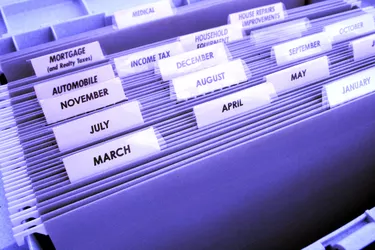With the New Year approaching, it's time to put your tax documents in order. Tax time can be nerve-wracking for some people. Most need to declutter their desks to find receipts and critical information. Others use the shoebox method for their filing system. They've dumped all tax-related documents in a shoebox. It's not organized, but at least it's together. Regardless, it's time to prepare.
Use Last Year’s Tax Return
Video of the Day
If you're unsure where to start, pull out last year's tax return. It will be a great reminder of what types of deductions you itemized or what standard deductions you filed. In addition, last year's tax return will guide you as to what tax paperwork needs to be attached.
Video of the Day
If you're having trouble locating last year's tax return, go to the online portal at the IRS or the individual who prepared your taxes.
Divide Documents With Files
Whether you have your documents in a filing cabinet or tossed in a shoebox, it's time to organize. Use an accordion folder. By using an accordion folder as a filing system, you'll not only be organized, but everything will be handy and portable. That will make it easier to take everything you need to your CPA or tax professional. Categories in the accordion file you should have are:
- personal information
- pay stubs
- receipts
- student loan information
- healthcare expenses
- mortgage rates
- childcare expenses
- charitable donations
Having all these documents in a file will make it easier to itemize your tax return. Itemized deductions can greatly lower your tax liability. But to do this, supporting documentation is necessary. By dividing all your expenses into separate files, you'll be able to provide accurate support documentation to the IRS.
Consider also: How to Time When You File Taxes
Personal Information for Tax Preparation
The correct personal information is the first step. Make sure you have yours and if applicable, your spouse's Social Security numbers. Social Security numbers for all dependents will also be required. You'll also need everyone's birthdates.
Income source documents need to go into the personal information file. Some examples of income sources include:
- wages and salaries
- retirement income
- gambling winnings
- dividends
It's important to have W-2 forms and 1099 forms in this file for all family members.
Documentation for Tax Credits
Some people don't itemize, so they think they don't need to keep records. But if you are going to file with a tax credit, you will need to organize your documentation and tax forms.
For instance, when taking advantage of the American Opportunity Credit you will need form 1098-T and documentation of all related education expenses. It's most efficient to keep the specific form and applicable expense documentation together.
Small Business Tax Preparation
Receipts for business expenses must be gathered and divided into categories. Some categories include:
- home office
- car
- charitable contributions
- salaries and benefits
- continuing education
- credit card interest as it relates to a business
Although the list goes on, the point is to make separate files. This could be the traditional filing cabinet method with paper, or you can scan the document and create appropriate folders on the computer.
Consider also: Why are Taxes Important?
Deal With Missing Documents
It's important to deal with a missing document quickly once discovered. Going through the process of dividing up your tax documents in files alerts you to possible holes in your information. Not only does organizing provide the ease of having everything handy, but it also alerts you to missing information that could cost time and money.
Help Preparing Taxes
The IRS rules and regulations can be daunting. Depending on your personal finances, it may take a tax professional to weed through them. A CPA can guide you as to what paperwork you need for the IRS.
Once you've gathered all your tax documents, a CPA can go a long way in helping you receive all the deductions you deserve and file for them correctly.
If you can't afford a CPA, the Free File Alliance may help. You must have an adjusted gross income (AGI) of less than $72,000 to qualify.
